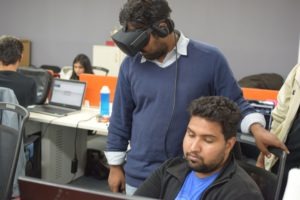In years past, the idea of future-proofing has become a popular goal for organisations aiming to stay ahead. But when you take a closer look, the notion of completely future-proofing a workforce just doesn’t hold up. That’s because the future is, by nature, unpredictable. Rather than trying to prepare people for a specific vision of what’s to come, the focus is shifting toward future-building—building a future-ready workforce: equipping individuals with the skills, mindset, and adaptability they need to thrive in a world of constant change.
Why Future-Proofing Fails
The pace of change we’re currently experiencing is unprecedented. This is driven by rapid technological advancements, evolving job markets, and shifting global dynamics. As a result, organizations are under increasing pressure to ensure their workforce is equipped with the right skills for an unpredictable future.
In this environment, traditional planning methods, like Gantt charts and rigid strategic roadmaps, often fall short. That’s because these rely on assumptions about what the future will look like—assumptions that reference things that have happened or worked in the past and can quickly become outdated.
So rather than trying to predict what’s coming, the more effective approach is to build a workforce that can respond in real time, a workforce that can adapt quickly, think critically, and navigate uncertainty with confidence.
▶️ WATCH
Mentorloop Industry Advisory Council member Christian Miran explains why planning for long-term future-proofing can hinder rather than help:
The Shift to Future-Building Strategies
Rather than attempting to predict and prepare for every possible future scenario, organizations are focusing on building adaptability and resilience within their teams. This involves fostering a culture of continuous learning and development, where employees are encouraged to acquire new skills and embrace change as a constant.
Key Strategies for Building a Future-Ready Workforce
1. Emphasizing Power Skills
Often mislabeled as “soft skills,” power skills such as empathy, adaptability, and curiosity are crucial for navigating change. These skills enable individuals to transfer their capabilities across various roles and adapt to new challenges effectively.
▶️ WATCH
Mentorloop Industry Advisory Council member Alana Bennett shares why so-called “soft skills,” which she prefers to call power skills, are the most important skills to nail.
2. Creating a Learning Culture
Organizations are encouraged to design environments that promote learning and growth. This involves integrating learning opportunities into daily workflows and encouraging employees to share their insights and experiences.
▶️ WATCH
Alana Bennett shares a simple truth: if you want a learning culture, you have to design for one—starting with your everyday routines.
3. Encouraging Experimentation
A culture of experimentation allows teams to test new ideas and approaches without fear of failure. This mindset fosters innovation and helps organizations adapt to changing circumstances more swiftly.
4. Participatory Governance
Involving employees in decision-making processes through participatory governance can enhance adaptability. This approach allows for diverse perspectives and encourages buy-in from team members, leading to more effective and agile decision-making.
▶️ WATCH
Christian Miran unpacks how participatory governance gives every team member a voice, and how shifting from consensus to consent can unlock more learning and momentum.
5. Leveraging Mentoring and Social Learning
Mentoring programs and social learning initiatives facilitate the transfer of knowledge and skills within organizations. These programs help employees learn from each other’s experiences and foster a sense of community and collaboration.
The Role of Technology and AI
While technology, particularly AI, is often viewed with apprehension due to fears of job displacement, it also presents opportunities for enhancing workforce capabilities. Organizations are exploring ways to integrate AI into their operations to complement human skills and free up employees to focus on more value-added tasks.
Final Thoughts
The journey towards a future-ready workforce is ongoing and requires a shift in mindset from rigid planning to flexible adaptation. By prioritizing power skills, fostering a culture of learning, and embracing technology, organizations can equip their teams to navigate the uncertainties of the future with confidence. The focus is not on predicting the future but on preparing to thrive in it, whatever it may hold.
Want to hear more expert insights on how you can effectively build a future-ready workforce? Watch our free live session with Mentorloop Industry Advisory Council members Alana Bennett and Christian Miran: Stop Future-Proofing Your Workforce, Start Future-Building.




